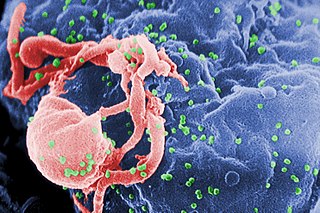Spermicide is a contraceptive substance that destroys sperm, inserted vaginally prior to intercourse to prevent pregnancy. As a contraceptive, spermicide may be used alone. However, the pregnancy rate experienced by couples using only spermicide is higher than that of couples using other methods. Usually, spermicides are combined with contraceptive barrier methods such as diaphragms, condoms, cervical caps, and sponges. Combined methods are believed to result in lower pregnancy rates than either method alone.

Microbicides for sexually transmitted infections are pharmacologic agents and chemical substances that are capable of killing or destroying certain microorganisms that commonly cause sexually transmitted infection.
The Division of Acquired Immunodeficiency Syndrome (DAIDS) is a division of the National Institute of Allergy and Infectious Diseases, which is part of the National Institutes of Health. It was formed in 1986 as a part of the initiative to address the national research needs created by the advent and spread of the HIV/AIDS epidemic. Specifically, the Division's mission is to increase basic knowledge of the pathogenesis, natural history, and transmission of HIV disease and to support research that promotes progress in its detection, treatment, and prevention. DAIDS accomplishes this through planning, implementing, managing, and evaluating programs in (1) fundamental basic research, (2) discovery and development of therapies for HIV infection and its complications, and (3) discovery and development of vaccines and other prevention strategies.

Pre-exposure prophylaxis for HIV prevention, commonly known as PrEP, is a form of pre-exposure prophylaxis to prevent HIV infection, the cause of HIV/AIDS.

The HIV Prevention Trials Network (HPTN) is a worldwide collaborative clinical trials network that brings together investigators, ethicists, community and other partners to develop and test the safety and efficacy of interventions designed to prevent the acquisition and transmission of HIV. HPTN studies evaluate new HIV prevention interventions and strategies in populations and geographical regions that bear a disproportionate burden of infection. The HPTN is committed to the highest ethical standards for its clinical trials and recognizes the importance of community engagement in all phases of the research process.

iPrEx was a phase III clinical trial to determine whether the antiretroviral medication emtricitabine/tenofovir could safely and effectively prevent HIV acquisition through sex in men who have sex with men and transgender women. iPrEx was the first human study of an HIV prevention strategy known as pre-exposure prophylaxis, or PrEP.
CAPRISA 004 is the name of a clinical trial conducted by CAPRISA. This particular study was the first to show that a topical gel could reduce a person's risk of contracting HIV. The gel used in the study contained a microbicide.
Zeda Fran Rosenberg is an American microbiologist and epidemiologist, active in HIV biology and prevention. She is the chief executive officer of the International Partnership for Microbicides (IPM). IPM was founded by Rosenberg in 2002 and is a nonprofit organization dedicated to developing microbicides and other innovative HIV prevention products and making them available for women in developing countries.
CONRAD is a non-profit organization scientific research organization that works to improve the reproductive health of women, especially in developing countries. CONRAD was established in 1986 under a cooperative agreement between Eastern Virginia Medical School (EVMS) and the United States Agency for International Development(USAID). CONRAD’s products are developed primarily for women in low-resource settings, in that they are designed to be safe, affordable and user-friendly. CONRAD is led by Scientific and Executive Director Gustavo Doncel, M.D., Ph.D. Primary funding for CONRAD comes from the U.S. President's Emergency Plan for AIDS Relief (PEPFAR) through the U.S. Agency for International Development (USAID), with additional funding from The Bill & Melinda Gates Foundation and the National Institutes of Health (NIH).
A rectal microbicide is a microbicide for rectal use. Most commonly such a product would be a topical gel inserted into the anus so that it make act as protection against the contract of a sexually transmitted infection during anal sex.
PRO 2000 is an experimental vaginal microbicide which has been proposed as a preventive medicine for reducing the risk of contracting HIV. It has never been recommended as an effective medicine to be used for any purpose. Some clinical trials have shown that under some conditions it may provide some protection against HIV.
A vaginal microbicide is a microbicide for vaginal use, generally as protection against the contraction of a sexually transmitted infection during vaginal sexual intercourse. Vaginal microbicides are topical gels or creams inserted into the vagina.

HIV/AIDS research includes all medical research that attempts to prevent, treat, or cure HIV/AIDS, as well as fundamental research about the nature of HIV as an infectious agent and AIDS as the disease caused by HIV.

Salim S. Abdool Karim, MBChB, MMed, MS(Epi), FFPHM, FFPath (Virol), DipData, PhD, DSc(hc), FRS is a South African public health physician, epidemiologist and virologist who has played a leading role in the AIDS and COVID-19 pandemic. His scientific contributions have impacted the landscape of HIV prevention and treatment, saving thousands of lives.

Dapivirine is a non-nucleoside reverse transcriptase inhibitor developed at Janssen Therapeutics. The International Partnership for Microbicides has held exclusive worldwide rights to dapivirine since 2014, building upon a 2004 royalty-free license to develop dapivirine-based microbicides for women in resource-poor countries.
HPTN 083 is a 2016 clinical trial which compares cabotegravir injections with oral use of Emtricitabine/tenofovir as pre-exposure prophylaxis ("PrEP") for prevention of HIV/AIDS.
Multipurpose prevention technologies (MPTs) are a class of products designed to address at least two health issues simultaneously, often focusing on sexual and reproductive health which includes contraception, human immunodeficiency virus (HIV) prevention, other sexually transmitted infection (STI) preventions, such as genital infection by human simplex virus (HSV) infection and human papillomavirus (HPV) infection. For example, MPTs can combine contraception and HIV prevention, contraception and other STI prevention, or the prevention of multiple STIs. Since the simultaneous use of multiple products with a single indication against each specific sexual and reproductive health issue is inconvenient, this method may affect adherence. As a result, the goal of developing a MPT as an all-in-one product is to combat this issue.

Dapivirine (DPV) Ring is an antiretroviral vaginal ring pioneered by the International Partnership for Microbicides (IPM) pending for regulatory review. It is designed as a long-acting form of HIV prevention for at-risk women, particularly in developing nations such as sub-Saharan Africa. IPM has rights to both the medication and the medical device. A total of four rings with different drug diffusion systems and polymer composition have been developed by IPM. The latest design, Ring-004, is a silicone polymer matrix-type system capable of delivering DPV intravaginally in a sustained manner.
Sharon Louise Hillier is an American microbiologist. She is the Richard Sweet Endowed Chair in Reproductive Infectious Disease and vice chair of the department of obstetrics, gynecology and reproductive sciences at the University of Pittsburgh Medical Center (UPMC) and Magee-Women's Research Institute.

Jeanne M. Marrazzo is an American physician-scientist and infectious diseases specialist. She is the director of the University of Alabama School of Medicine Division of Infectious Diseases and focuses on prevention of HIV infection using biomedical interventions. Marrazzo is also a fellow of the American College of Physicians and Infectious Disease Society of America. On August 2, 2023 Lawrence A. Tabak, acting director for the National Institutes of Health, named Jeanne M. Marrazzo as director of NIH’s National Institute of Allergy and Infectious Diseases.









